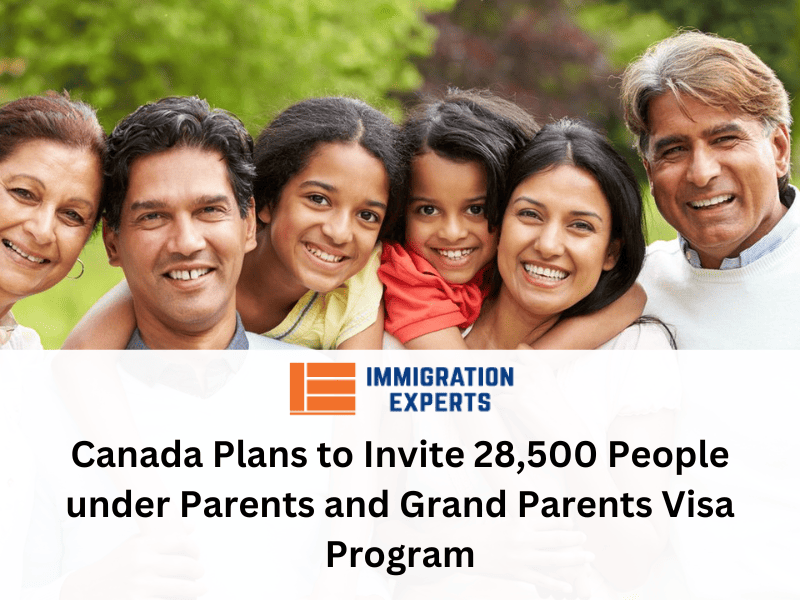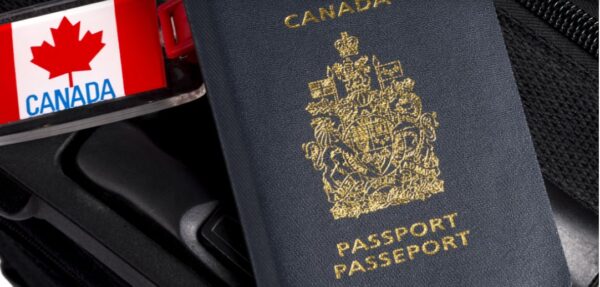051 8439995, 042 35911332

When compared to January 2022, the number of permanent residents who entered Canada via the Parents and Grandparents Program (PGP) increased significantly by about 60%. Specifically, the PGP welcomed 2,065 new permanent residents in January 2023, whereas the corresponding figure was 1,300 in January 2022.
Furthermore, Canada aims to facilitate the immigration of 28,500 permanent residents through the PGP in 2023. This target represents an increase from the 27,255 permanent residents who arrived in Canada via the PGP in 2022, which itself marked a remarkable growth of 132% compared to the 11,740 individuals who arrived through the program in 2021.
According to Canada’s Immigration Level Plans for 2023-2025, the objective is to welcome 465,000 permanent residents during the year 2023. In January 2023, Canada successfully received 50,885 new permanent residents, indicating an increase of approximately 44% compared to the 35,450 newcomers who arrived in January of the previous year.
Among the total immigration target for 2023, the family sponsorship category aims to welcome 106,500 permanent residents. This category encompasses spouses, common-law partners, children, as well as parents and grandparents through the Parents and Grandparents Program (PGP). As of right currently, Canada has accepted 13,000 newcomers through the PGP as well as spousal/child sponsorship.
Things You Will Find In This Page
The process of the Parents and Grandparents Program (PGP) in Canada
The Parents and Grandparents Visa Program (PGP) in Canada offers citizens and permanent residents the opportunity to sponsor their parents and grandparents to immigrate to and settle permanently in the country. Recognizing the value of family assistance and reunion, this program enables families to stay together and gives parents and grandparents the chance to take advantage of living in Canada. The PGP seeks to encourage the immigration of parents and grandparents through a selective application procedure, strengthening relationships between family members and enhancing Canada’s cultural fabric. The main features of the Parents and Grandparents Visa Program will be covered in this guide, along with the prerequisites, the application process, and significant points to keep in mind for both sponsors and applicants.

Eligibility Criteria for Parents and Grandparents Program (PGP)
To be eligible for the Parents and Grandparents Program (PGP) of Canada, sponsors must meet certain criteria. Here are the general eligibility requirements:
- If you have filled out an Interest to Sponsor form on the IRCC website within the time frame of October 13, 2020 (12:00 PM EDT) to November 3, 2020 (12:00 PM EST).
- Citizenship or Permanent Residence: Sponsors must be Canadian citizens or permanent residents of Canada.
- Age Requirement: The age of the sponsor should be 18 years.
- Financial Eligibility: Sponsors must show that they have the necessary money to sustain both their family and the sponsored individuals. The Low Income Cut-Off (LICO) statistics established by the Canadian government define the required income, which varies depending on the size of the family unit.
- The undertaking of Financial Support: Sponsors must sign an undertaking, a legal agreement, to financially support the sponsored parents or grandparents for a specific period. This commitment ensures that the sponsored individuals do not rely on social assistance programs upon arrival.
- Relationship Requirement: Sponsors can only apply to sponsor their parents or grandparents. The PGP does not include other family members, such as siblings or extended relatives.
- To sponsor a family member, the sponsor is required to sign an undertaking committing to financially support them for 20 years, starting from the time they become permanent residents. Additionally, the sponsor must agree to repay any social assistance benefits received by the sponsored family members (if applicable) for 20 years.
The Immigration, Refugees and Citizenship Canada (IRCC) has not yet released specific information regarding the Parents and Grandparents Program (PGP) for 2023. In previous years, IRCC implemented a lottery system to randomly select sponsors who would receive an Invitation to Apply (ITA) through the PGP.
Since 2020, all ITAs for the PGP have been issued to sponsors who expressed their interest to sponsor between October and November 2020. The most recent PGP lottery took place in October 2022. There were still roughly 155,000 possible sponsors in the pool at that point.
Super Visa
A Super Visa is a type of visa issued by the Canadian government that allows parents and grandparents of Canadian citizens and permanent residents to stay in Canada for an extended time. Unlike a regular visitor visa, which is typically valid for up to six months, a Super Visa is valid for up to 10 years.
Grandparents and parents with Super Visas are permitted to stay in Canada for up to two years at each visit without having to renew their status. This allows them to spend more time with their family in Canada without having to constantly reapply for a new visa.
To be eligible for a Super Visa, applicants must meet certain requirements, including providing proof of private medical insurance coverage, undergoing a medical exam, and meeting specific financial criteria to demonstrate their ability to support themselves while in Canada.
It’s important to note that a Super Visa is not a pathway to permanent residency in Canada, and holders of this visa are not allowed to work in Canada. Additionally, the application process can be lengthy and requires thorough documentation and proof of eligibility.
Application Process for Super Visa
The application process for a Super Visa involves several steps:
- Complete the application: Applicants must fill out the Application for a Temporary Resident Visa and the Family Information Form, which can be found on the IRCC website.
- Provide supporting documents: Applicants must provide supporting documents to demonstrate their eligibility for the Super Visa. This includes a letter of invitation from their child or grandchild in Canada, proof of private medical insurance coverage, and evidence of their relationship with the sponsor.
- Undergo a medical exam: Applicants must undergo a medical exam from a physician approved by the Canadian government to ensure they meet the health requirements for entry into Canada.
- Pay the application fee: Applicants must pay the application fee, which is non-refundable, and submit their application and supporting documents to the appropriate Canadian visa office.
- Wait for processing: The processing time for a Super Visa application varies but typically takes several weeks or months. Applicants may be required to attend an interview or provide additional information during the processing period.
